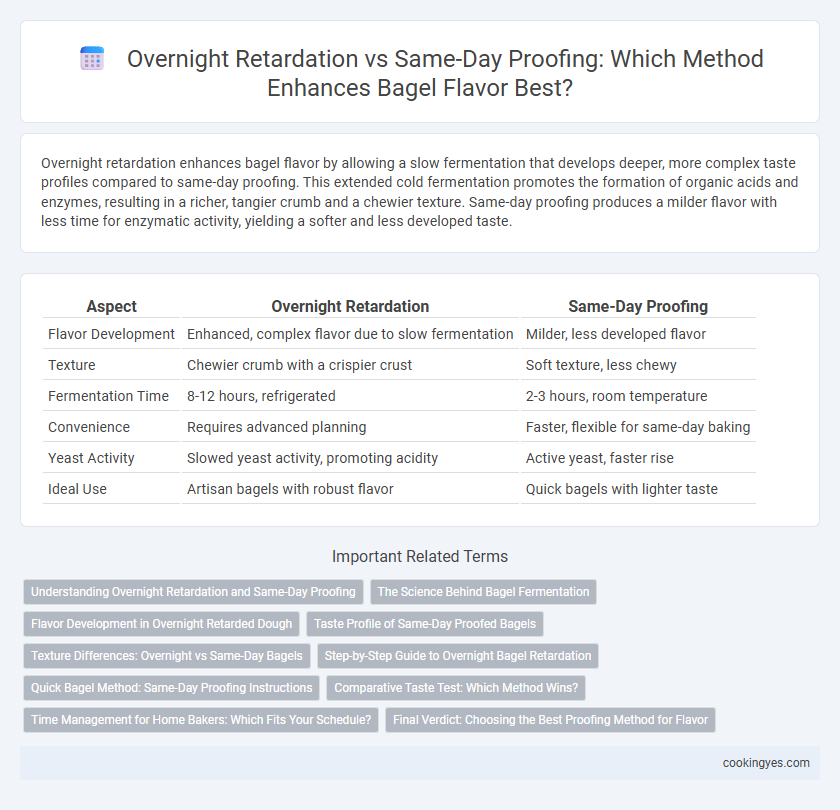Overnight retardation enhances bagel flavor by allowing a slow fermentation that develops deeper, more complex taste profiles compared to same-day proofing. This extended cold fermentation promotes the formation of organic acids and enzymes, resulting in a richer, tangier crumb and a chewier texture. Same-day proofing produces a milder flavor with less time for enzymatic activity, yielding a softer and less developed taste.
Table of Comparison
| Aspect | Overnight Retardation | Same-Day Proofing |
|---|---|---|
| Flavor Development | Enhanced, complex flavor due to slow fermentation | Milder, less developed flavor |
| Texture | Chewier crumb with a crispier crust | Soft texture, less chewy |
| Fermentation Time | 8-12 hours, refrigerated | 2-3 hours, room temperature |
| Convenience | Requires advanced planning | Faster, flexible for same-day baking |
| Yeast Activity | Slowed yeast activity, promoting acidity | Active yeast, faster rise |
| Ideal Use | Artisan bagels with robust flavor | Quick bagels with lighter taste |
Understanding Overnight Retardation and Same-Day Proofing
Overnight retardation involves cold-proofing the bagel dough in the refrigerator for 12 to 24 hours, allowing enzymes to slowly break down starches and develop complex, tangy flavors. Same-day proofing, by contrast, uses a shorter fermentation period at room temperature, resulting in a milder taste and softer texture. The extended enzymatic activity during overnight retardation enhances the bagel's depth of flavor and chewy crust, preferred by traditional bakers seeking authenticity.
The Science Behind Bagel Fermentation
Overnight retardation slows yeast activity at low temperatures, enhancing complex flavor compounds through prolonged fermentation and organic acid development in bagels. Same-day proofing accelerates fermentation, resulting in milder, less tangy flavor due to shorter yeast metabolism and limited ester production. Controlling fermentation time and temperature directly influences the balance of flavor precursors such as lactic acid and ethanol, which are critical to authentic bagel taste.
Flavor Development in Overnight Retarded Dough
Overnight retardation enhances bagel flavor by allowing slower yeast fermentation, which produces more complex organic acids and aromatic compounds compared to same-day proofing. This extended cold fermentation promotes deeper Maillard reactions during baking, resulting in a richer, tangier taste and improved crust texture. Flavor development in overnight retarded dough is superior due to prolonged enzymatic activity breaking down starches and proteins, intensifying the overall sensory profile of the bagel.
Taste Profile of Same-Day Proofed Bagels
Same-day proofed bagels exhibit a milder, less complex flavor profile due to shorter fermentation times, resulting in a subtle sweetness and softer crust. The rapid proofing process limits the development of organic acids and ethanol, which traditionally contribute to the characteristic tang and chewiness of bagels. Consequently, same-day proofed bagels often taste fresher but lack the depth and nuance found in those subjected to overnight retardation.
Texture Differences: Overnight vs Same-Day Bagels
Overnight retardation in bagel dough fermentation enhances gluten development, resulting in a chewier texture and more complex flavor profiles due to prolonged enzymatic activity. Same-day proofing produces softer, less dense bagels with a milder taste, as the shorter fermentation limits gluten strength and flavor depth. The choice between these methods significantly impacts the final bagel's texture, with overnight-retarded dough yielding the signature firm crust and dense crumb prized in traditional New York-style bagels.
Step-by-Step Guide to Overnight Bagel Retardation
Overnight retardation enhances bagel flavor by slowing yeast fermentation at low temperatures, allowing complex organic acids and aromas to develop. Begin by mixing the dough and perform an initial bulk fermentation at room temperature for 30-60 minutes. Transfer the dough to the refrigerator for 12-18 hours, then shape, proof at room temperature until visibly risen, and boil before baking to achieve traditional chewy texture and depth of flavor.
Quick Bagel Method: Same-Day Proofing Instructions
Same-day proofing in the Quick Bagel Method accelerates fermentation, producing a softer crust and milder flavor compared to the complex, tangy notes developed during overnight retardation. This method uses warm temperatures and shorter proofing times, resulting in a chewier texture favored for convenience and consistency. While overnight retardation enhances flavor depth through slow yeast activity, same-day proofing prioritizes speed without significantly compromising the classic bagel taste.
Comparative Taste Test: Which Method Wins?
Overnight retardation enhances bagel flavor by allowing extended fermentation, which develops complex sour notes and chewy texture, preferred by artisanal bakers. Same-day proofing yields a milder taste with a softer crumb and quicker production time but lacks the depth and tang found in slow-fermented bagels. Comparative taste tests consistently show that overnight-retarded bagels achieve superior flavor complexity and authenticity, making them the favored choice among flavor connoisseurs.
Time Management for Home Bakers: Which Fits Your Schedule?
Overnight retardation enhances bagel flavor by allowing a slow fermentation that develops deeper taste and better texture, ideal for bakers with flexible evening schedules. Same-day proofing accelerates the process, fitting seamlessly into busy mornings but producing a milder flavor and chewier crumb. Home bakers should assess their daily routines to choose between the depth of flavor from overnight chilling and the convenience of faster, same-day proofing.
Final Verdict: Choosing the Best Proofing Method for Flavor
Overnight retardation enhances bagel flavor by allowing slow fermentation, which develops complex acids and aromas, resulting in a chewier texture and deeper taste compared to same-day proofing. Same-day proofing produces quicker fermentations but often lacks the rich flavor profile achieved through extended cold proofing. For optimal bagel flavor, bakers prefer overnight retardation as the best method to balance texture and taste complexity.
Overnight retardation vs same-day proofing for bagel flavor Infographic

 cookingyes.com
cookingyes.com